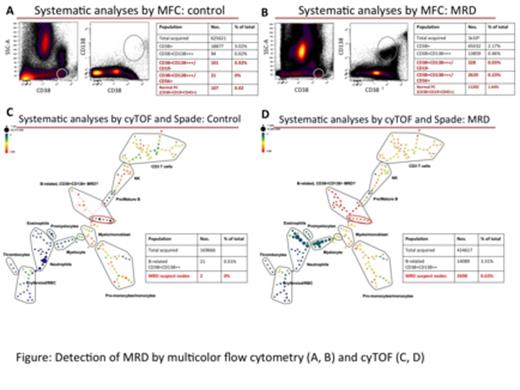Abstract
The introduction of novel agents for the treatment of multiple myeloma (MM) has shifted the emphasis towards achieving a molecular complete remission (CR). Traditional methods to detect malignant plasma cells (PC) in minimal residual disease (MRD) utilize multicolor flow cytometry (MFC) to detect aberrant phenotypes. However fluorescent-based MFC assays are limited by the number of markers, difficulty in standardization of assays and overlap of signal between the fluorescent channels. These limitations can be overcome by cyTOF, a flow cytometry assay based on time-of-flight mass spectrometry using antibodies labeled with heavy-metal ions, permitting simultaneous assessment of large panels of markers. We have developed a novel highly sensitive mass cytometry protocol for the detection of MRD. BM from 5 MM patients and 1 non-myeloma control were RBC-lysed and labeled with MM markers for MFC and cyTOF. cyTOF is a flow cytometry based on mass spectometry where antibodies are labeled with heavy-metal ions, permitting utilization of more markers without concern for spillover. The MFC panel included CD38, CD138, CD45, CD56, CD19, CD117. Labeled cells for MFC were acquired by BD LSR Fortessa.. The panel for cyTOF comprised markers for cells across the hematopoietic spectrum and those specific for MM. Labeled cells acquired with cyTOF were analyzed using SPADE. Limits of detection (LOD) and quantification (LOQ) for MFC are based on prior reports. The results were compared with an independent commercial MFC-based assay (Genoptix). Malignant PC could be detected by MFC and cyTOF based assasys (See Figure). We were able to detect MRD in three subjects that had no detectable disease by an independent commercial MFC based assay (Genoptix). This can be attributed to acquiring at least 1x106 for our assays leading to a lower LOD and LOQ (greater sensitivity). Using cyTOF and SPADE, we could detect MRD in 4/5 patients. Overall our panel with cyTOF has a lower LOD than MFC for detection of MRD. Early detection of MRD in MM patients using a highly sensitive flow cytometry like cyTOF will help in risk stratification, predicting relapse and studying response to therapy.
Chari:Celgene: Consultancy, Membership on an entity's Board of Directors or advisory committees, Research Funding; Millennium/Takeda: Consultancy, Research Funding; Onyx: Consultancy, Research Funding; Array Biopharma: Consultancy, Other: Institutional Research Funding, Research Funding; Biotest: Other: Institutional Research Funding; Novartis: Consultancy, Research Funding. Jagannath:Bristol Myers Squibb: Honoraria; Janssen: Honoraria; Merck: Honoraria; Novartis: Honoraria; Celgene: Honoraria.
Author notes
Asterisk with author names denotes non-ASH members.


This feature is available to Subscribers Only
Sign In or Create an Account Close Modal